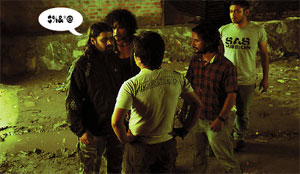 |
Loot got away without much cuts, but with the censor board becoming stricter, other films might not be as lucky. Before a movie can be released in theatres, producers have to send their reels to the board requesting it to be censored, rated and cleared. If the board finds 'immoral' or 'objectionable' material, it asks filmmakers to delete these scenes. If the producers don't comply, the board doesn't issue a rating and the movie can't be released.
Nishcal Basnet, who wrote and directed Loot, says, "The profanities were situational and completely in line with the characters. Even young children use these words frequently in their everyday lives. I don't think the board is really concerned. It just doesn't want to get into a bureaucratic mess."
Currently the board is made up of seven members, out of whom four are ministry employees and the other three are 'experts' nominated by the government. All explicit content is at the mercy of their scissors.
History tells us that oppressive regimes have always regarded cinema as a tool of social control. In fact, the ideals sought to be protected by our own censors have hardly changed since the Panchayat days. National interest, social harmony, libel and morality are ambiguous terms open to the interpretation of the ones in power. The censorship of Dasgaja, Aago, Dasdhunga, and Loot proves that such ambiguity remains only to serve political purposes.
Censorship of all creative work finds its way into legislation in the name of maintaining social norms and preventing 'untoward' activities. But the censors' tendency to focus exclusively on 'sex scenes' while overlooking depictions of graphic violence suggests that none of them have an understanding of media.
It is the same hypocrisy that removes a film-poster of a bare-backed woman to prevent accidents, while right in the middle of Purano Bus Park, the city's central transport hub, a hoarding board advertises an emulsion by depicting a woman's posterior remains undisturbed for months.
This lack of understanding is also echoed in the draft version of the Ministry of Information and Communications' Media Policy 2012 that was made in sole consultation with JICA, the Japanese aid agency. The draft shows that censorship still remains, and is likely to remain for years, an ideological base in the government's understanding of film as a mass medium. The need to adopt strict age-based ratings does not fall among any of the draft's 16 points.
Filmmaker Bhusan Dahal says, "Why do censors get to determine social evils? Films are essentially a mode of expression and a reflection of society. I think Nepali society has become more violent. We are also increasingly liberal and open about sex and use swear words on a regular basis. Considering sex a taboo and censoring films for their sexual content seem outdated."
However, there is a downside to this trend of making 'real and gritty' cinema. In an attempt to cash in the supposed popularity of obscenities, the latest Nepali film, The Last Kiss: A Unique Love Story is littered with profanities and lurid depictions of sex even after censorship. While comments made on its Youtube page are hardly cerebral, they still show that viewers are not gullible and won't be impressed by crassness alone.
Such tasteless, loud and vulgar films reveal how little these filmmakers, like their censor board counterparts, understand cinema, or the audience.
Read also:


